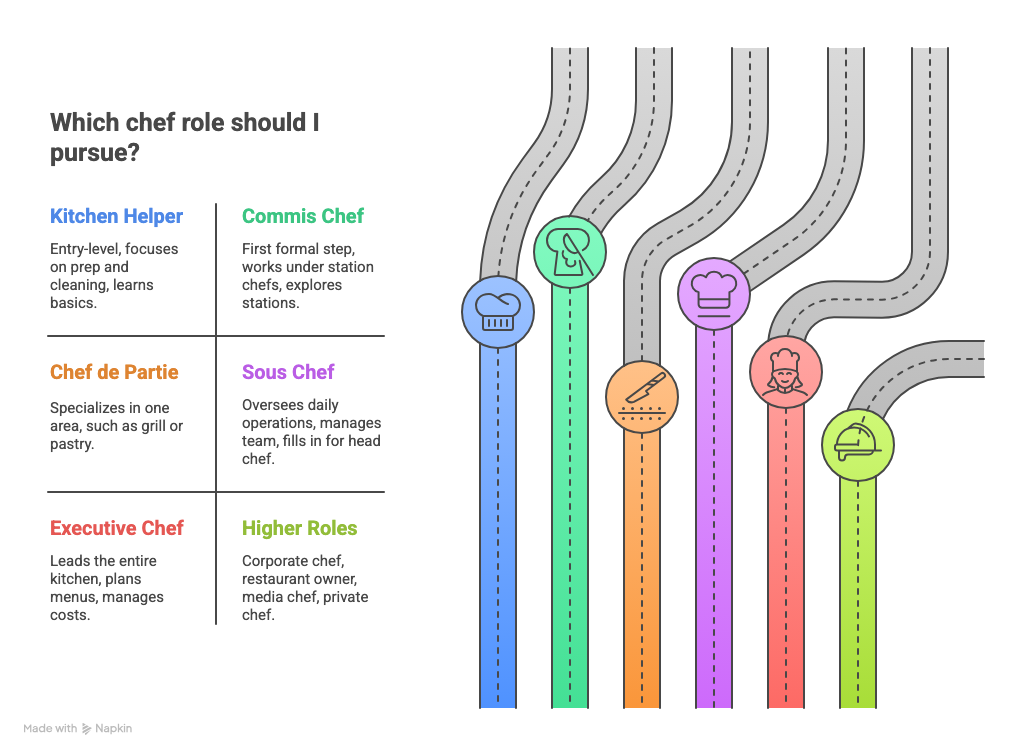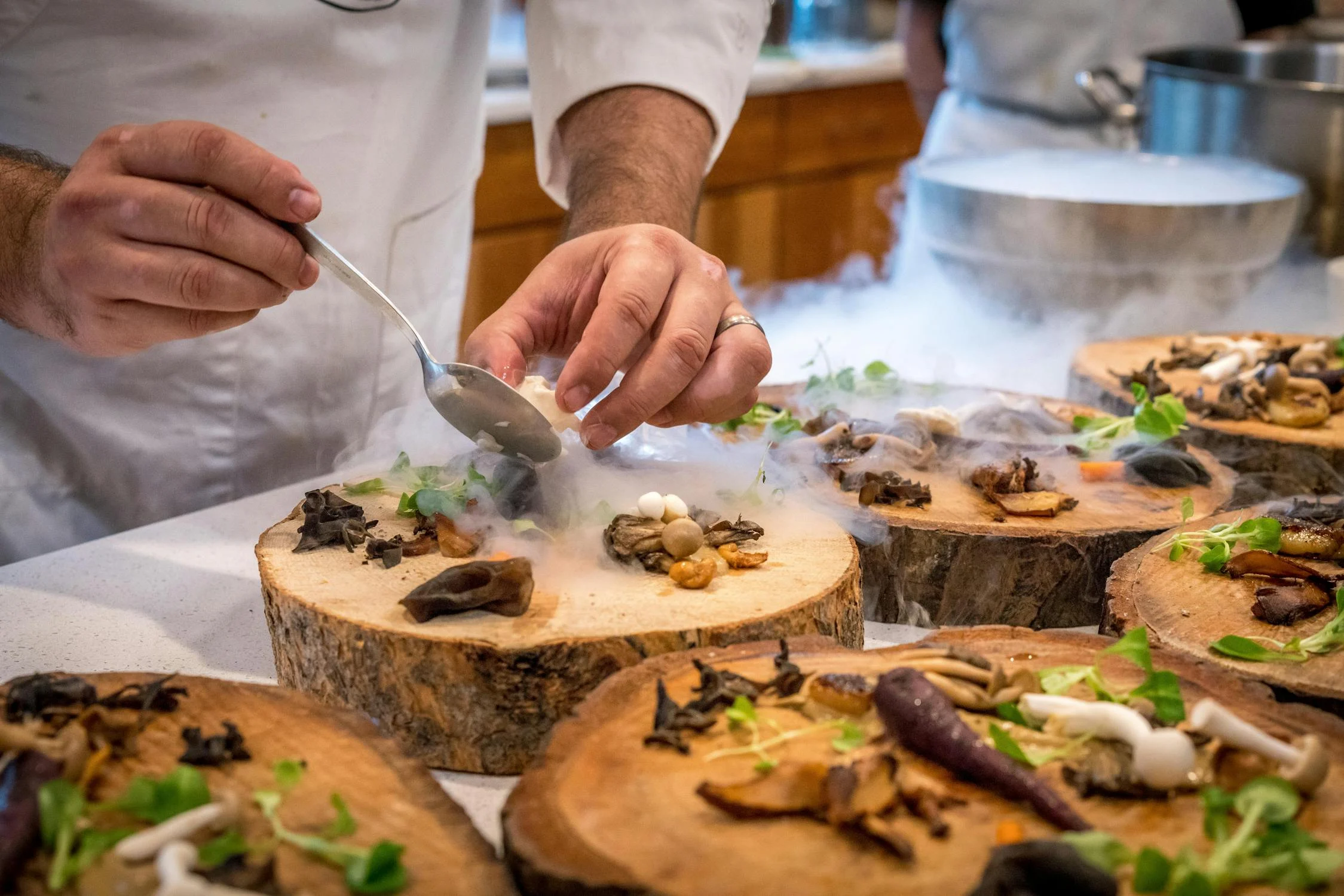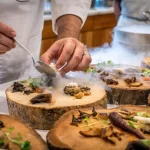The word “chef” takes our imagination to someone who’s desperately busy in a posh kitchen. Wearing a long white hat and an apron, he is either busy tossing foods in a pan, or supervising other chores that support the overall task of cooking; all of it to ensure to what goes into the plate meets or, even better, exceeds the guests’ expectations!
But chefs are not only spotted in an affluent 5-star hotel. They exist across a wide-ranging spectrum – including small hotels to our own homes (think of mom). They give flavour, and warmth to foods and many fall in love with their craft so much that they readily pursue it as their main occupation – a means to earn their living.
Let’s talk about professional chefs in this article – things they do, qualifications they need to have, responsibilities they share, skills that make them become better at work and more. If you are a wannabe chef, expect real answers to your most pressing questions here. Continue reading!
What does the word ‘chef’ mean? (The origin/etymology of the word ‘chef’)
The word ‘Chef’ refers to a ‘skilled professional cook’ – someone who is in charge of a professional kitchen. It is believed the word has its root in the French term “chef de cuisine,” which means “chief of the kitchen.” Generally speaking, a chef stays at the top of the food chain in a professional kitchen – cooking pricey foods, supervising others in the job, and managing all important activities in and beyond the kitchen. They are the boss, under them work other professionals.
A chef may have gathered his needed skills while working in a professional setup under the guided instructions of senior chefs or s/he may be graduated from a cooking school learning the art and then practicing it thereafter. Many professional chefs start their careers as cooks before advancing through the respective culinary ranks. This takes us to the word “cook”, which is often misinterpreted as chef.
Difference between a chef and a cook
The two terms – chef and cook – are often used interchangeably, but they hold striking individual differences. But how they differ professionally if both are engaged with the art of cooking? The answer lies in the details. Chefs have formal training, leadership roles, and creative input; whereas cooks focus on execution and specific cooking tasks.
| Key Areas | Chef | Cook |
|---|---|---|
| Skill | Advanced, with extensive training and years of professional experience. They generally possesses comprehensive knowledge of various cuisines and advanced techniques. | Basic to intermediate level, with focused knowledge of specific cooking methods. May excel in particular areas but again may have less comprehensive culinary knowledge. |
| Responsibilities | Oversees kitchen operations, creates and updates menus, develops signature recipes, manages culinary teams, controls food costs, and ensures quality standards. | Executes recipes and prepares specific components of dishes as directed. Handles food preparation, cooking techniques, and basic kitchen duties like maintaining station cleanliness and inventory. |
| Training | Often has formal culinary education from accredited institutions, with certifications, diplomas or degrees. Typically completes apprenticeships under master chefs and pursues continuous professional development. | Primarily learns through on-the-job training and experience. May have vocational training or short-term culinary courses, but formal education is less common or extensive. |
| Creativity | Expected to innovate and create original dishes, experiment with flavors and techniques, and develop distinctive culinary styles. Often researches food trends and develops seasonal menus. | Primarily follows established recipes and procedures. May suggest improvements but is less involved in creative menu development or conceptualizing new dishes from scratch. |
| Career Path | Progresses through kitchen ranks (commis, chef de partie, sous chef) before becoming head chef or executive chef. May become a restaurant owner, consultant, or culinary educator later in career. | May specialize in particular cooking areas (grill, sauté, pastry) and advance to senior cook positions. Can progress to chef roles with sufficient experience and additional training. |
| Work Environment | Works in fine dining restaurants, luxury hotels, resorts, cruise ships, or as private chefs for high-profile clients. Often in environments where food is a primary focus and key selling point. | Works across diverse settings including casual restaurants, cafeterias, schools, hospitals, catering companies, and institutional food services where consistent food production is prioritized. |
What does a chef do?
The difference between chef and cook sufficiently highlights basically everything a chef does and is expected to do. Here’s a simplified version of it: Chefs plan what meals to make, prepare the ingredients, cook the dishes, and make sure everything tastes good and looks nice. They also keep the kitchen clean and safe, and sometimes tell other kitchen workers what to do. Some chefs also help order food supplies and manage the kitchen budget. Depending on the role and setup, they may be required to do other related activities.
Main responsibilities of a chef
The main responsibilities of a chef, the essential ones, are briefly listed below –
- Planning the menu
- Preparing and cooking food
- Making sure food tastes and looks good
- Keeping the kitchen clean and safe
- Managing kitchen staff
- Ordering ingredients and supplies
- Checking food quality and freshness
Skills chefs have
Here are some key skills chefs have:
- Cooking skills
- Time management
- Attention to detail
- Creativity with food
- Leadership
- Staying calm under pressure
- Good communication
- Basic math for measurements and portions
- Knowledge of food safety and hygiene
Hospitality and guest management can also be important to learn for a chef, especially in certain roles. Like in open kitchens, events, or small restaurants, chefs often interact with guests directly, meaning being polite, friendly, and professional matters for them.
Types of known chefs
Some well-known types of chefs include the following:

- Executive Chef (Head Chef) – In charge of the whole kitchen – including planning, staffing, and menus.
- Sous Chef – The second-in-command. Helps the head chef and manages the kitchen when the head chef is away.
- Chef de Partie (Station Chef) – Handles one area of the kitchen, for example, grill, sauces or pastry.
- Commis Chef – A junior chef who helps the more experienced chefs.
- Pastry Chef – This professional specializes in baking and desserts.
- Sauce Chef (Saucier) – Focuses on making sauces, soups, and sometimes sautéed dishes.
- Grill Chef (Grillardin) – Cooks grilled and sometimes also the fried items.
- Garde Manger – Prepares cold dishes like salads, dressings, and cold meats.
These roles are more common in larger or fine-dining kitchens, where the kitchen team is structured like a brigade. Want a simpler version of this list too?
Career path and growth opportunities

If a chef may start as a kitchen helper, doing basic prep and cleaning while learning how things work. After that, you might become a cook, preparing dishes and following recipes, especially in smaller or casual kitchens. With more training and experience, you move into a formal role as a commis chef, where you assist senior chefs and explore different stations. From there, you can grow into a chef de partie, running your own section like grill or pastry. Next is the sous chef, who helps manage the team and daily kitchen operations. At the top is the executive chef, in charge of the whole kitchen, menus, and budgets. Some chefs go even further into higher roles like owning a restaurant, becoming a corporate chef, or working in media.
Sample job description of chefs for employers
If you’re hiring a chef and need a clear, professional job description, the chef JD template below can help you get started. Please note that you should to customize it to match your restaurant’s style, cuisine, team size, or specific expectations. Whether you’re looking for a line cook, sous chef, or head chef, this template can be adjusted to fit your needs.
Job Title: Chef
Location: [Your business name], [Add your location]
Job Type: Add your preferred type – Full-Time/Temporary/Any other type
Reports to: Executive Chef / Restaurant Manager/Any one else
About Us:
At [your business name], we believe in delivering great food with heart. Our kitchen is built on creativity, consistency, and a strong team spirit. We’re looking for a passionate and skilled chef who loves cooking, thrives under pressure, and takes pride in every dish they prepare and manage.
Job Summary:
As a Chef, you’ll be responsible for preparing high-quality meals, maintaining kitchen standards, and supporting a positive kitchen culture. You should be comfortable leading by example, managing a small team, and bringing fresh ideas to the table.
Key Responsibilities:
- Prepare and cook a variety of dishes according to the menu and recipes
- Ensure all meals meet quality and presentation standards
- Supervise and support kitchen staff during service
- Help manage stock levels, reduce food waste, and handle inventory
- Follow food safety, hygiene, and cleanliness guidelines at all times
- Assist with menu planning and seasonal specials
- Maintain a clean and organized kitchen environment
What We’re Looking For:
- Proven experience as a chef or cook in a professional kitchen
- Passion for food and attention to detail
- Strong understanding of food safety and sanitation standards
- Ability to work in a fast-paced environment with a calm attitude
- Team player with good communication and leadership skills
- Culinary school diploma or equivalent experience is a plus
What We Offer:
- Competitive salary based on experience
- Flexible scheduling
- Staff meals and discounts
- Opportunities for growth and creativity
- A supportive, energetic work environment
To Apply:
Send your resume to [your email ID] or drop by in person during off-peak hours. We’d love to meet you
Note:
This chef job description is suitable for a Line Chef (Chef de Partie) or a General Kitchen Chef in a mid-sized restaurant or hotel – someone who prepares and cooks food, manages kitchen standards, and occasionally leads a small team. It’s a well-rounded template that can be adapted to various roles.
If you want to adapt this JD for specific types of chefs, here’s what you would like to tweak –
1. Executive Chef (Head Chef) job description
Change Areas:
- Job Title: Executive Chef
- Reports to: Owner / General Manager
- Job Summary: Emphasize kitchen leadership, full menu ownership, budgeting, and team management
- Key Responsibilities: Add hiring/training staff, managing kitchen budgets, vendor relations, menu engineering
- What We’re Looking For: Require leadership experience, high-level decision making, 5–10 years in professional kitchens
2. Sous Chef job description
Change Areas:
- Job Title: Sous Chef
- Reports to: Executive Chef
- Job Summary: Focus on supporting the head chef and supervising day-to-day operations
- Key Responsibilities: Emphasize staff supervision, quality control, stepping in for the Executive Chef
- What We’re Looking For: Emphasize leadership under pressure and 3–5 years experience
3. Pastry Chef (Pâtissier) job description
Change Areas:
- Job Title: Pastry Chef
- Job Summary: Focus on preparing desserts, pastries, and baked items
- Key Responsibilities: Replace savory cooking tasks with dessert creation, chocolate work, dough prep
- What We’re Looking For: Highlight pastry-specific skills, creativity, attention to detail
As mentioned above, the above chef job description (the parent one and the related ones with change areas) is for reference only. You should tweak it to reflect your own needs.
Sample chef interview questions for a prospective job seeker
Here’s a set of sample chef interview questions that a prospective job seeker can prepare for. These cover skills, experience, kitchen behavior, creativity, and leadership — all areas hiring managers typically focus on:
Technical & Culinary Skills Questions
- Can you walk us through how you prepare your station before a busy shift?
- How do you ensure consistency in taste and presentation across multiple orders?
- Which cuisines are you most confident working with, and why?
- What’s your signature dish, and what makes it special?
- How do you handle substitutions or special dietary requests?
Experience & Work Ethic Questions
- Tell us about a time you worked under pressure in a busy kitchen. How did you handle it?
- What’s one mistake you’ve made in the kitchen, and what did you learn from it?
- Describe a typical day in your previous role.
- How do you stay current with food trends or new techniques?
- Do you have experience with food cost control and inventory management?
Problem Solving & Creativity
- How do you approach designing a new menu or dish?
- If a supplier delivered poor-quality ingredients right before service, what would you do?
- How do you handle a dish being sent back by a customer?
Team & Culture Fit
- How do you motivate junior kitchen staff during a long shift?
- Have you ever had a conflict with a coworker or manager? How was it resolved?
- What role do you usually take in a team — leader, mentor, or doer?
Career Goals & Self-Awareness
- Why do you want to work at this restaurant/hotel?
- Where do you see yourself in 3–5 years?
- What’s your biggest strength in the kitchen? Your biggest weakness?
- What do you love most about being a chef?
Online search interest for the word ‘chef’
The rise in searches for “chef” indicates a strong, consistent interest from both aspiring chefs and employers alike. Whether due to the influence of food media, increased dining out, or the professionalization of the industry, chefs are in demand.
Approx. salary of a chef globally
1. United States
- Average Salary: $40,000 – $70,000 per year (up to $80,000+ in major culinary cities)
- Executive Chef: $60,000 – $100,000+ per year
- Line Cook / Junior Chef: $30,000 – $45,000 per year
- Private Chef: $60,000 – $100,000+ per year (depending on client and location)
2. United Kingdom
- Average Salary: £18,000 – £30,000 per year
- Head Chef: £30,000 – £45,000 per year
- Sous Chef: £22,000 – £35,000 per year
- Commis Chef / Junior Chef: £17,000 – £22,000 per year
3. Canada
- Average Salary: CAD $35,000 – $55,000 per year
- Executive Chef: CAD $55,000 – $90,000 per year
- Line Cook: CAD $28,000 – $40,000 per year
4. Australia
- Average Salary: AUD $50,000 – $65,000 per year
- Executive Chef: AUD $70,000 – $120,000 per year
- Junior Chef: AUD $40,000 – $55,000 per year
5. European Union (e.g., France, Germany, Italy)
- Average Salary: €20,000 – €35,000 per year
- Executive Chef: €40,000 – €70,000 per year
- Sous Chef: €25,000 – €45,000 per year
6. Middle East (e.g., UAE, Qatar)
- Average Salary: $30,000 – $60,000 per year
- Executive Chef: $70,000 – $120,000+ per year (up to $150,000+ in luxury establishments)
- Commis Chef: $20,000 – $30,000 per year
7. Southeast Asia
- Singapore: $25,000 – $45,000 per year average
- Thailand, Vietnam, etc.: $15,000 – $30,000 per year
- Executive Chef: $35,000 – $60,000 per year
- Junior Chef: $12,000 – $20,000 per year
Factors Influencing Chef Salaries:
- Location: Cities with a higher cost of living or greater culinary demand (e.g., New York, London, Dubai) tend to offer higher salaries.
- Experience: More experienced chefs, especially those in senior positions like Executive Chef or Sous Chef, generally earn higher wages.
- Type of Establishment: Chefs in Michelin-starred restaurants, luxury hotels, or private clients often earn more than those working in casual dining or smaller establishments.
- Role and Responsibilities: Senior roles (Executive Chef, Pastry Chef, etc.) come with higher salaries due to leadership and managerial duties.
- Education and Certifications: Culinary school graduates often command 10-15% higher starting salaries.
- Seasonal Factors: Tourism trends can affect chef salaries in resort destinations.
- Benefits Package: Health insurance, housing allowances, and other perks can substantially enhance total compensation.
Please note that the data is gathered from general references available online and may fluctuate based on various factors, some of which we have outlined above. For the latest information, please visit websites such as PayScale, Glassdoor, and Salary.com where salary data is regularly updated.
FAQs
While both prepare food, a chef typically has formal training, leadership responsibilities, and creative control in the kitchen. A cook generally executes recipes under supervision and may not be involved in planning or menu creation.
Chefs often attend culinary schools for formal education and gain experience through apprenticeships or on-the-job training. Many start as kitchen assistants or cooks and work their way up over the years.
There are several key roles, including:
Executive Chef (overall in charge)
Sous Chef (second-in-command)
Chef de Partie (station chef)
Pastry Chef, Grill Chef, Garde Manger, etc.
Each role specializes in a certain area of food preparation or kitchen management.
Chef salaries vary widely depending on location, experience, and establishment type. Please refer to the above data for a general overview.
We hope this article on chefs, their types, roles, duties and other information has helped you gather the needed information. If you have any suggestions for improvement, please write to us in the comment box. We are updating career wise information of several other professions on this website. Keep coming back for new content!












